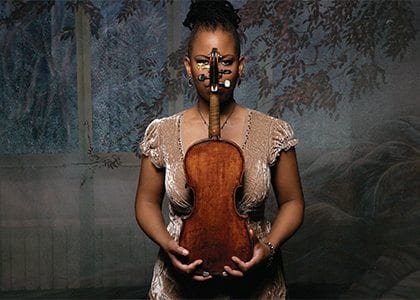

Regina Carter
Regina Carter’s recent album, Southern Comfort, is an interpretation of the inventive American music made south of the Mason-Dixon Line and east of the Mississippi, during the decades directly after Reconstruction.
A virtuoso at the jazz violin, Carter will be playing the music of Southern Comfort on Oct. 17 as part of the Celebrity Series of Boston at Sanders Theatre at Harvard University. Tickets are still on sale.
The album is mostly a meditation on her paternal grandfather—an Alabama coal miner—whom she never met, but who left a long, strong spiritual imprint on the family.
“It’s my journey. It’s about finding out about my father’s side of the family,” said Carter in a recent interview with the Banner.
“It’s been a really interesting journey. Doing the research of what kinds of music was being played in the South when he was alive…took months of digging. What I found was a mixture of all kinds of music from the Irish, the Native Americans and former slaves. It was all mixed-up together.”
The result is a moving collection of songs—a feat of remarkable American folk anthropology—that is as aurally powerful as it is a personal flight into a southern black family’s past.
Southern Comfort is the second of two albums (the other is Reverse Thread) that Carter has produced after receiving the prestigious MacArthur “Genius” Award for her work in jazz.
She recalls receiving the 2006 award with humor.
“I got the call very early in the morning, so the first thing I thought was that somebody was calling for some money,” she said. “But it turned out to be a real surprise.”
Carter says the $600,000 prize allowed her to explore the jazz, African and American folk genres more deeply.
The stunning results are songs on Southern Comfort like Miner’s Child, which evokes the raucous music sang by hillbillies up in the Appalachia Mountains around 1910. Cornbread Crumbled in Gravy is a lush lullaby meant, it seems, to tempt a baby into sleep. It is a drowsy dirge evocative of the reluctant departure of a loved one or, maybe, the mournfulness slaves must at times felt.
Other songs, like Shoo-Rye and Trampin’ speak of confidence and courage, and serve also as statements of braggadocio and boisterousness—the cultural and capitalistic beginnings of a certain American way.
Carter’s pose as she performs violin is stately, giving insight to her intellectual precision and comprehensive understanding of how a common music can be made so grand.
The music she creates or interprets persistently flirts with the best of American cultural achievement—and, at times, is transcendent. As such, Carter’s work earns a place among the best of what we enjoy about other uniquely organic American artists like Aaron Copland, Ella Fitzgerald, Augusta Savage or Tennessee Williams.
Carter’s efforts over the years have matured as she has earnestly searched for finding clarity and wisdom through her art.
“When I was young, I just wanted be a star…you know, a household name,” she said. “Now, I just want to be honest in my work. I want to get out of my own way and give people what is the best in me. And I want to find my way into people. Right now, I am just glad to be able to make a living doing what I do best.”






